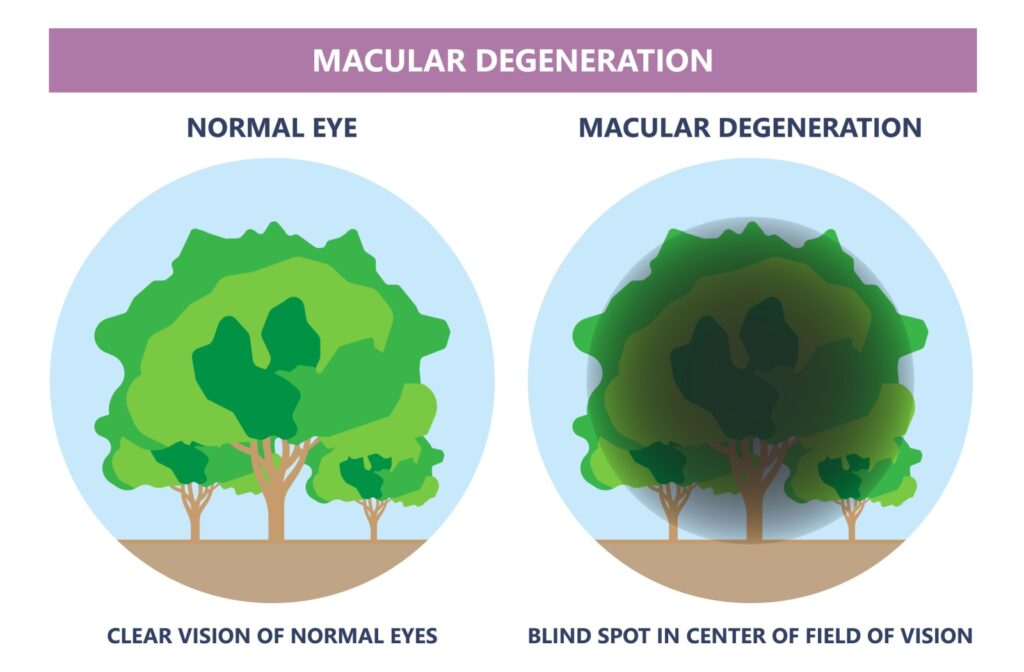Macular degeneration is a common eye condition that typically affects people over the age of 50, which is why it is commonly referred to as age-related macular degeneration (AMD). It occurs when the macula, which is responsible for central vision, starts to deteriorate. This can lead to blurry or distorted vision and difficulty seeing fine details.
While there is no cure for macular degeneration, early detection is key in managing the condition and preventing further vision loss. Some of the early warning signs of macular degeneration that you should be aware of may include:
- Blurry or distorted vision
- Changes in color perception
- Dark spots or empty spaces in your central vision
- Difficulty recognizing faces
- Sensitivity to glare
- Decreased depth perception
- Difficulty reading
- Straight lines appearing wavy or crooked
Signs To Watch For
Blurry Or Distorted Vision
The most common early warning sign of macular degeneration is blurry or distorted vision. This can affect your ability to see objects clearly, making tasks such as reading, driving, or watching TV difficult. Blurry or distorted vision may also cause you to see dark spots or empty spaces in your central vision.
Changes In Color Perception
Macular degeneration may also cause changes in color perception. This can manifest as a decrease in the vibrancy or intensity of colors, making them appear duller than usual. You may also notice a loss of contrast sensitivity, making it difficult to differentiate between similar shades and hues.
Dark Spots Or Empty Spaces In Central Vision

As macular degeneration progresses, it can cause the formation of dark spots or empty spaces in your central vision. This is due to the damage and deterioration of cells in the macula, which are responsible for sharp, detailed central vision. These dark spots or empty spaces may make it challenging to see clearly and perform daily tasks.
Difficulty Recognizing Faces
Macular degeneration can also make it difficult to recognize faces. This can be especially challenging in social situations and may lead to feelings of isolation or anxiety. As the condition progresses, you may find it increasingly challenging to see facial features clearly and distinguish between different faces.
Sensitivity To Glare
In some cases, macular degeneration can cause increased sensitivity to glare. This can make it challenging to see in bright environments, such as outdoors on a sunny day or under harsh lighting conditions. It may also cause discomfort and headaches when exposed to glare.
Decreased Depth Perception
Another sign of macular degeneration is a decrease in depth perception. This can affect one’s ability to judge distances accurately, making tasks like driving or navigating stairs more challenging. One may find themselves misjudging the distance between objects or having difficulty with tasks that require precise depth perception.
Difficulty Reading
Another early warning sign of macular degeneration is difficulty reading. This can be attributed to the deterioration of the macula, which is responsible for central vision and allows us to see details clearly. As the condition progresses, you may find reading smaller print or distinguishing between letters increasingly challenging.
Straight Lines Appearing Wavy Or Curved
A common symptom of macular degeneration is the distortion of straight lines. This can make objects appear wavy or curved, even though they are actually straight. You may notice this while reading text on a page or seeing door frames or window panes appear distorted.
What To Do If You’re Experiencing These Symptoms
If you are experiencing any of these symptoms, it is essential to schedule an appointment with your eye doctor. They can perform a comprehensive eye exam and evaluate the health of your macula. Early detection and treatment of macular degeneration can help slow its progression and preserve your vision. Additionally, there are low vision aids and strategies that can help you manage the impact of macular degeneration on your daily life, such as:
- Using magnifying glasses or devices for reading
- Adjusting lighting and using anti-glare filters
- Incorporating contrast-enhancing techniques, like using a dark pen on white paper for writing
- Utilizing voice-to-text technology for tasks like typing and composing emails
Prevention And Management
While there is no cure for macular degeneration, there are steps you can take to help prevent or slow down its progression:
- Quit smoking: Smoking has been linked to an increased risk of developing macular degeneration. If you smoke, quitting can help reduce your chances of developing this condition.
- Eat a healthy diet: A diet rich in fruits and vegetables, especially those high in antioxidants like lutein and zeaxanthin, may help protect against macular degeneration.
- Exercise regularly: Maintaining a regular exercise routine can help improve blood flow to the eyes and may reduce your risk of developing macular degeneration.
- Protect your eyes from UV rays: Wear sunglasses with 100% UV protection when you’re outside to protect your eyes from harmful UV rays.
- Monitor your vision: Pay attention to any changes in your vision and report them to your eye doctor right away. Early detection and treatment can make a big difference in preserving your vision.
- Get regular eye exams: Schedule regular comprehensive eye exams, especially if you are over 50 or have a family history of macular degeneration.
It’s also important to manage any other underlying health conditions, such as high blood pressure and high cholesterol, as they can also increase your risk of developing macular degeneration.
Recognize The Signs
Recognizing the early warning signs of macular degeneration is crucial for maintaining eye health and preventing severe vision loss. By staying informed and vigilant, you can take control of your eye health and preserve your vision for years to come. Always consult your eye doctor if you notice any changes in your vision, as early detection and intervention are vital.
At Dr. Jennifer L. Shane & Associates, we are committed to providing comprehensive eye care and educating our patients about ways to maintain healthy vision. Schedule an appointment with us today, and let us help you protect your eyes from macular degeneration and other sight-threatening conditions.



